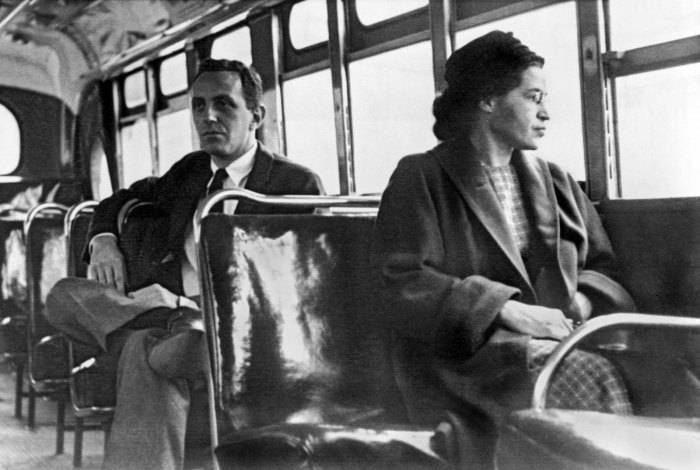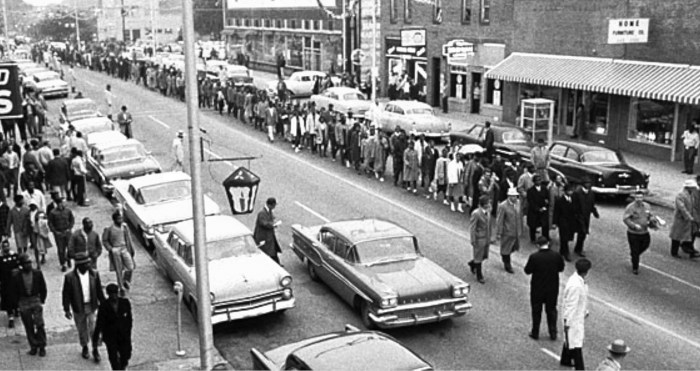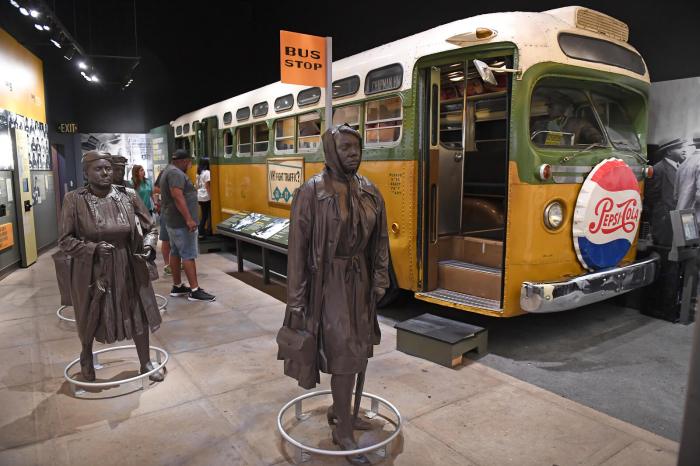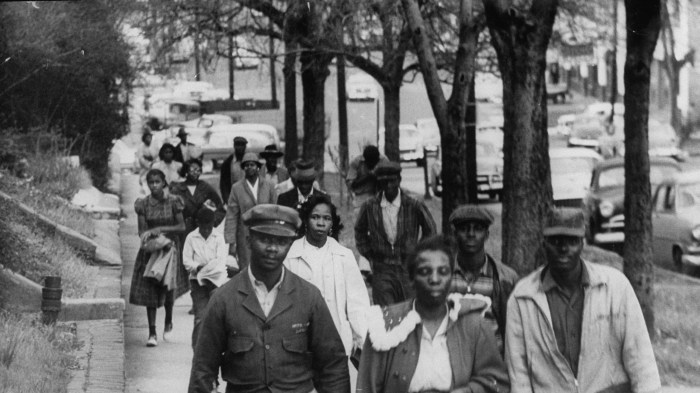Books about the Montgomery Bus Boycott offer a profound exploration into one of the pivotal events of the Civil Rights Movement. These literary works provide invaluable insights into the struggle for equality and the indomitable spirit that fueled this historic movement.
Through the lens of notable authors, these books shed light on the significance of the boycott, the key players involved, and the lasting impact it had on the fight for civil rights.
Historical Background

The Montgomery Bus Boycott holds immense historical significance as a pivotal event in the American Civil Rights Movement. It emerged as a response to the deeply rooted racial segregation and discrimination prevalent in the city’s transportation system.
The boycott commenced on December 5, 1955, following the arrest of Rosa Parks, an African American woman, for refusing to surrender her bus seat to a white passenger. Her act of defiance ignited a widespread protest among Montgomery’s Black community, who united under the leadership of Martin Luther King Jr.
Timeline of Key Events
- December 1, 1955:Rosa Parks is arrested for violating the city’s segregation laws.
- December 5, 1955:The Montgomery Bus Boycott begins.
- June 13, 1956:The Supreme Court rules that bus segregation is unconstitutional.
- December 20, 1956:The Montgomery Bus Boycott ends after 381 days.
Role of Rosa Parks and Martin Luther King Jr.
Rosa Parks’ act of defiance became a catalyst for the boycott. Her refusal to give up her seat sparked a movement that challenged the very foundations of racial segregation in Montgomery.
Martin Luther King Jr. emerged as the leader of the boycott, using his eloquence and charisma to rally support and maintain nonviolent resistance. His “I Have a Dream” speech, delivered at the end of the boycott, became a defining moment in the Civil Rights Movement.
Books and Authors
Notable Books about the Montgomery Bus Boycott
- The Montgomery Bus Boycott: A Historyby David Garrow
- Walking with the Wind: A Memoir of the Montgomery Bus Boycottby Fred Gray
- Stride Toward Freedom: The Montgomery Storyby Martin Luther King Jr.
Author Biographies
- David Garrow:American historian and Pulitzer Prize winner known for his work on the Civil Rights Movement.
- Fred Gray:American lawyer who played a key role in the Montgomery Bus Boycott and other Civil Rights cases.
- Martin Luther King Jr.:Baptist minister and civil rights leader who led the Montgomery Bus Boycott.
Perspectives and Contributions of Different Authors
David Garrow’s book provides a comprehensive history of the boycott, drawing on extensive research and interviews. Fred Gray’s memoir offers a firsthand account of the events, as he was one of the attorneys representing the boycotters.
Martin Luther King Jr.’s book, written during the boycott, captures the spirit and determination of the participants. It also highlights the nonviolent principles that guided the movement.
Impact and Legacy: Books About The Montgomery Bus Boycott

Immediate Impact on Montgomery’s Transportation System
The Montgomery Bus Boycott had a profound impact on the city’s transportation system. The boycott resulted in a significant loss of revenue for the bus company, which eventually agreed to desegregate its buses.
The boycott also led to the formation of the Montgomery Improvement Association (MIA), which played a crucial role in organizing and sustaining the boycott. The MIA later became a model for other civil rights organizations.
Long-Term Effects on the Civil Rights Movement
The Montgomery Bus Boycott is widely recognized as a turning point in the Civil Rights Movement. It demonstrated the power of nonviolent resistance and inspired other protests and boycotts across the country.
The boycott helped to raise national awareness of the issue of racial segregation and contributed to the growing momentum for civil rights reform.
Other Boycotts and Protests Inspired by the Montgomery Bus Boycott
- Greensboro Sit-Ins (1960)
- Freedom Rides (1961)
- Birmingham Bus Boycott (1963)
Cultural Representation

Depiction in Literature, Film, and Other Media
The Montgomery Bus Boycott has been depicted in various forms of media, including literature, film, and television.
- Literature:Rosa Parks’ autobiography, My Story, and Martin Luther King Jr.’s Stride Toward Freedomprovide firsthand accounts of the boycott.
- Film:The 2002 film The Rosa Parks Storyand the 2018 documentary The Montgomery Bus Boycott and the Women Who Started Itoffer dramatized and historical perspectives on the boycott.
- Television:The 1995 miniseries Kingincludes a portrayal of the Montgomery Bus Boycott.
Role of These Representations in Shaping Public Understanding
These cultural representations have played a significant role in shaping public understanding of the Montgomery Bus Boycott. They have helped to educate and inspire audiences, and have contributed to the boycott’s legacy as a symbol of nonviolent resistance.
Accuracy and Authenticity of These Portrayals
While these representations have generally been praised for their accuracy and authenticity, some critics have raised concerns about the portrayal of certain events and individuals.
Modern Applications

Relevance in Contemporary Social Justice Movements
The Montgomery Bus Boycott remains relevant in contemporary social justice movements as a model for nonviolent resistance and collective action.
The boycott’s principles of nonviolence, unity, and economic pressure have inspired modern-day boycotts and protests against racial injustice, police brutality, and other forms of oppression.
Examples of Modern Boycotts and Protests
- Boycott of Chick-fil-A (2012):A boycott organized by LGBTQ+ activists in response to the company’s donations to anti-LGBTQ+ organizations.
- Black Lives Matter protests (2013-present):A series of protests and demonstrations against police brutality and racial injustice, often involving boycotts of businesses and institutions.
- Boycott of Goya Foods (2020):A boycott organized in response to the company’s CEO’s praise for former President Donald Trump.
Lessons Learned and Strategies Employed
Modern-day boycotts and protests have drawn inspiration from the Montgomery Bus Boycott’s emphasis on nonviolent resistance, community organizing, and economic pressure.
The lessons learned from the boycott continue to guide activists and organizers in their efforts to create social change.
Detailed FAQs
What was the significance of the Montgomery Bus Boycott?
The Montgomery Bus Boycott was a pivotal event in the Civil Rights Movement, sparking a wave of protests against racial segregation and discrimination in public transportation.
Who were the key figures involved in the boycott?
Rosa Parks and Martin Luther King Jr. were among the most prominent leaders of the boycott, playing crucial roles in organizing and mobilizing the African American community.
What were the long-term effects of the boycott?
The boycott led to the desegregation of Montgomery’s public transportation system and became a catalyst for the broader Civil Rights Movement, inspiring similar protests and boycotts across the country.